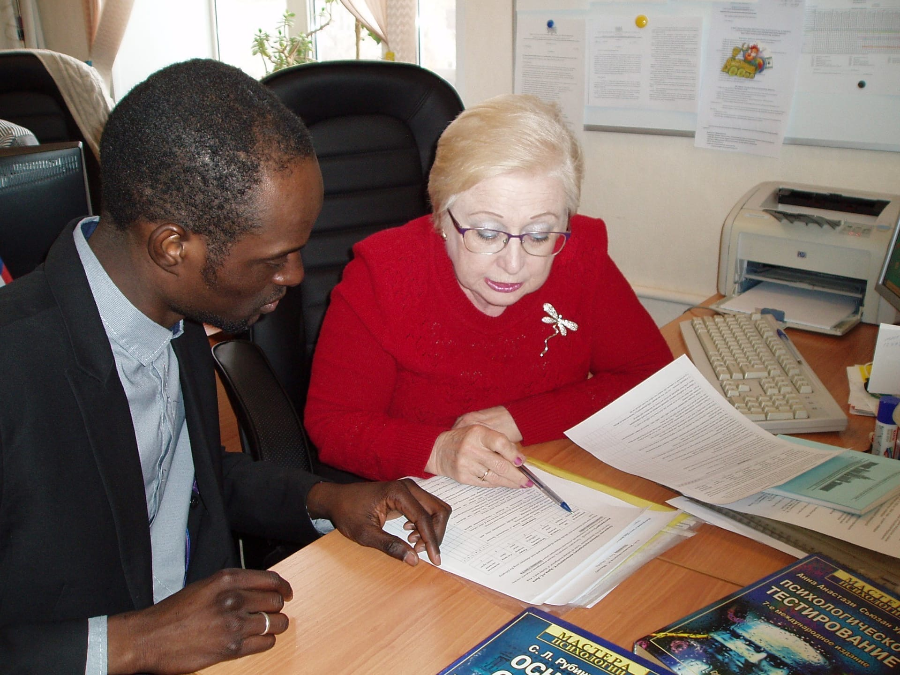For 1.5 years now, a student from the Republic of Côte d'Ivoire has been taking training to major in a Master’s degree programme at the Department of General Psychology, Psychodiagnostics, and Counselling at the Faculty of Psychology of South Ural State University. In this interview, Yaro Abubakar spoke on studying at the Russian university, grasping psychological science, linguistic adaptation, and life in Chelyabinsk.
– Yaro, why did you choose the Faculty of Psychology?
– I have been interested in psychology since school and I have already obtained a Bachelor's degree in psychology in my country. During the open house day in 2018, we met the academic staff to choose the programme for studying. I really liked consulting with the teacher of psychology Elena Gudkova.
– What does your family think about your choice of profession and education in Russia?
– My family supports me financially and morally in my choice. Obviously, my father wanted me to go to a different country, but I managed to convince him. The fact that I am studying psychology does not cause much controversy in my family. My father only asked me if I could get a good job after the training and I said yes.
– In your opinion, what are the specifics of taking training in a Master’s degree programme?
– Studying in a Master’s degree propgramme means obtaining a higher level of education. One may hear talks among students that no one in Master's degree programmes actually studies, but those are mere stereotypes. For me, psychology here helped me discover different approaches to the study of psychological science and practice. You know, practice and freelance work is important when studying in a Master’s degree programme, and I am happy with the number of hours of practical training in psychology that allowed me to easily continue working on the theoretical material I learned. My group mates, who are already working as psychologists, always share information. All this gave me impetus to engage in science, and I am going to continue my studies in the postgraduate programme.
– How can you sum up the results of the 1.5 years of training: what have you achieved, and what knowledge have you acquired during this time?
– I am afraid to answer this question before defending my diploma, but I can say that I have received qualified education with the necessary practical trainings, and I can already work as a consulting psychologist.

– What disciplines, during the period of studying, seemed to be the most important for the future work as a psychologist?
– There are many disciplines that will be of great use for my future professional career. I cannot distinguish a specific one, because all the academics are great, and choosing a discipline for me is like choosing a certain teacher.
– What was the hardest thing to master during that time?
– The hardest thing for me was to say what I think and to tell about my thoughts because of the language barrier. But thanks to the support of my group mates and academic staff who help me paraphrase everything I want to say, I managed to more or less overcome it. In fact, my group mates and teachers have always provided massive and important support! When I kept coming to the department, I thought that one day the staff would tell me that I'm bothering them, but they welcomed me with a smile every day!
– What prospects – in employment, professional and scientific activity – do you see? Is this a high-in-demand profession in your home country? Are you planning to continue studying in the postgraduate programme?
– In my country psychology exists, but unfortunately, many people seek advice from leaders, grandparents, and religious leaders. But in other fields like education, politics, business, health, there are many opportunities after studying psychology. In addition, I want to do research on several topics relevant to patriotism, tolerance, the world around me, as well as mental health, that is why I want to apply for the postgraduate programme.
– Tell us, please, how do you spend your free time?
– In my free time I watch a lot of videos on psychology. I like sports, but I also like to have fun! I do not manage to read a lot, but I am working on this.
– Do you want to connect your future life with Russia?
– Of course, and I am answering this question for the first time. I hope that I will have a Russian wife, but not now, because studying and working takes all my time, and later I want to work in an organisation connected with my country and Russia, or just in Russia.
The interview was conducted by the Head of the Department of General Psychology, Psychodiagnostics, and Counselling at the Faculty of Psychology, Associate Professor, Candidate of Sciences (Psychology) Svetlana Morozova.




